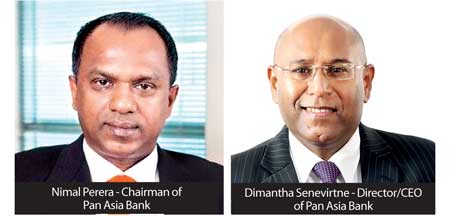Reply To:
Name - Reply Comment
Pan Asia Banking Corporation PLC saw its post tax profit for the year ended December 31, 2015 (FY’15) increasing by as much as 151percent to surpass the key milestone of achieving a billion rupee profit.
The bank closed the year with a post tax profit of Rs.1.04 billion well supported by the above average growth in gross loans and advances, higher margins and improved efficiency.

The earnings per share has risen to Rs. 3.53 from Rs.1.41 a year ago.
Meanwhile for the quarter ended December 31, 2015 (4Q’15) the bank has increased its after tax profit by as much as 110 percent to Rs. 289.6 million.
The bank has grown its net loans and receivables by as much as 40 percent or Rs. 23.9 billion during the year to Rs.84.2 billion. This is by far the highest growth in net loans and advances recorded by a licensed commercial bank in 2015.
This is also above the economy’s private sector credit growth of 24 percent for the first eleven months.
Commenting on the results in 2015, the bank’s Director and Chief Executive Officer Dimantha Seneviratne said the bank was able to record this exceptional performance due to proactive decisions and effective execution of strategies capitalizing on the opportunities in the macro-economy while managing the risks.
“This performance reflects the immense potential of Pan Asia Bank and our contribution to the economy where we have disbursed our funds in to all sectors and regions in the country. Our Retail, SME and Corporate segments reached out to all areas of the country uplifting many industries and living standards of the people whilst creating financial inclusion,” he added.
Outlier in RoE sphere
At a time when the banking sector Return on Equity (RoE) comes under pressure due to narrowing margins, Pan Asia Bank has continuously driven its return to its share holders up to 19.94 percent by the end of FY 2015, virtually doubling the RoE from 9.81 percent in December 2014. The bank’s RoE is now amongst the highest in the industry and beyond.
Stronger core-banking performance
The bank has made tremendous progress in its core-banking performance as its fourth quarter Net Interest Income (NII) has risen by 23 percent to Rs.1.04 billion and the entire year’s NII increased by 45 percent to Rs.3.96 billion..
Despite the pressure on banking sector margins, Pan Asia Bank has expanded its net interest margin to 4.34 percent from 3.82 percent in December 2014 due to prudent re-pricing and proactive assets and liability management.
In order to support its lending drive, the bank raised Rs.4 billion in debentures at very competitive rates which was oversubscribed on the opening day itself, demonstrating the strong confidence placed by investors on the bank’s current and future strategies.
Cost efficiencies at play
Despite increase in operating costs in absolute terms, the bank continued to bring down its cost-to-income ratio to below 53 percent from 61 percent in December 2014 through introduction of lean management practices, process automation and eliminating non-value adding activities in the processes.
The Return on Assets was doubled to 1.14 percent during FY 2015, further demonstrating the effectiveness and the quality of the bank’s assets.
Hundred billion asset base through quality portfolio
Pan Asia Bank recorded a significant milestone in surpassing an asset base of Rs.100 billion by end September 2015 keeping its promise to its stakeholders.
In effect, the bank’s balance sheet has grown by 35 percent or Rs.28.2 billion to end the year at Rs. 107.8 billion. In perspective, the bank’s assets have grown more than five folds in just 6 years as the bank’s asset base by the end of FY 2009 was just under Rs.22 billion.
Meanwhile the deposit base of the bank grew by 20 percent or 12.8 billion to Rs. 77.7 billion.
Further, in September 2015, the bank completed its re-financing green facility with the Global Climate Partnership Fund (GCPF) by taking the receipt of US $ 10 million (Rs.1.43 billion) re-financing which strengthened the FCY funding of the balance sheet.
Despite the higher precautionary provisions for possible loan losses, in a noteworthy move, the bank managed to further improve its asset quality as both its gross and net non-performing loan ratios declined to 4.84 percent and 3.26 percent respectively from 5.73 percent and 3.78 percent in December 2014.
Capital adequacy levels – both Core Capital and Total Capital ratios remained at 7.82 percent and 12.30 percent respectively by the end of FY 2015, well above the regulatory minimums of 5 percent and 10 percent respectively.